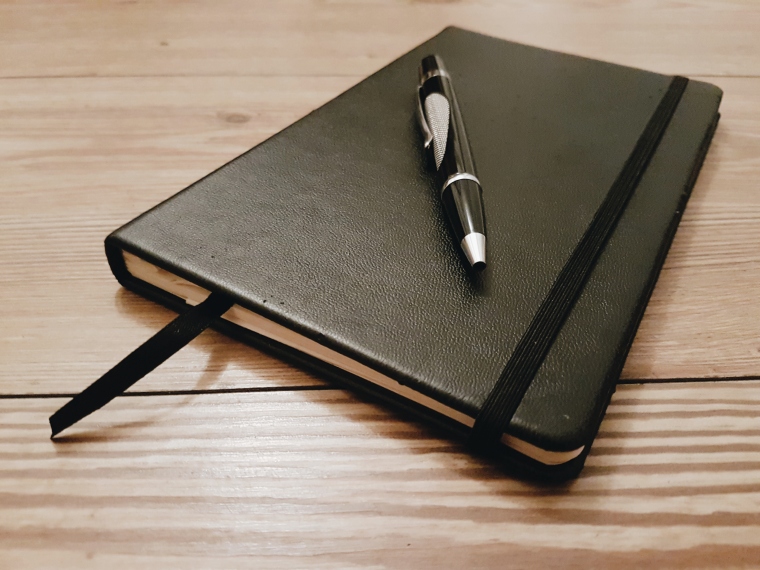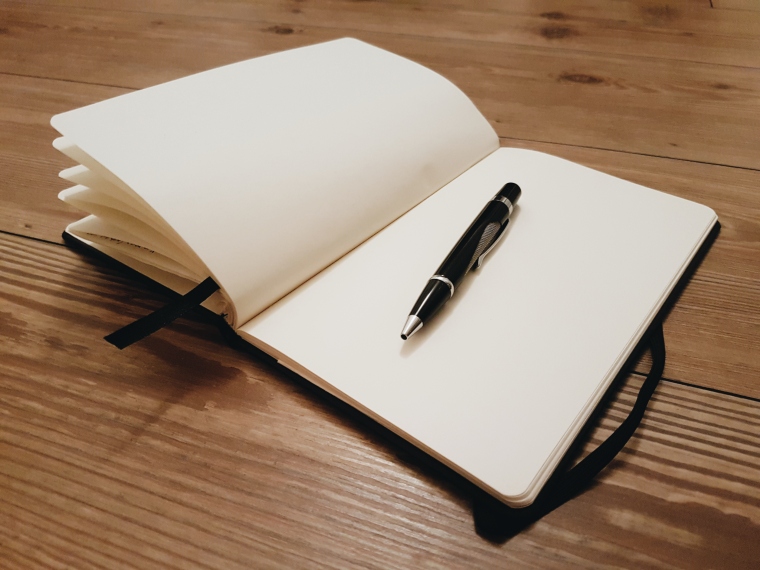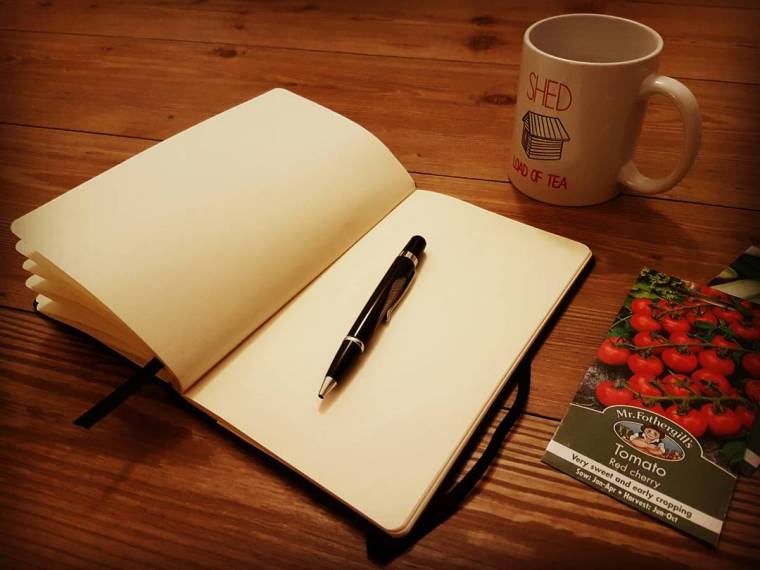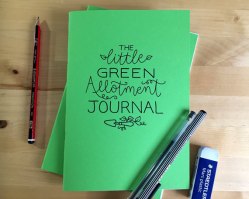Some of the most influential people in society have kept a journal.
Whether it was a component in their success is difficult to say, but they saw the need to keep a journal as an important exercise in their lives.
Is journaling about writing?
There are bloggers who I immediately think of as writers. Whose use of language engages, inspires and enables me as the reader to not just read about their thoughts and musing, but to sense and experience their ideas and enjoy the images their use of words conjure up in my mind.
The bonus for me and many others is they just happen to write about gardening. A few of my favourites include Andrew O’Brien, David Marsden and James Robbins.


I write, but I struggle with the idea of myself as a writer. When I piece together my blog posts I see it as a functional outpouring. In part, it is an approach that enables me to clarify and cement my understanding of a topic. It’s also, I hope, a method that allows me to provide value to others – specifically those who grow their own fruit and vegetables and especially those who wish to try.
I have two main elements to my blog. One called ‘articles’ and the other ‘allotment diary’. Both provide me with the opportunity to record my activities and learning and also allow a cathartic release.

The important point is you don’t have to be or think of yourself as a writer to put down your thoughts on to paper. The process of journaling has an array of benefits and certainly as a record and a reflection of your experiences of keeping an allotment or kitchen garden.
Here are 5 reasons why keeping an allotment journal is hugely beneficial:
- You will be more organised.
Journals are not just a vessel for recording your feelings or scribbling out thoughts on deep and meaningful topics – although it’s a very useful aid for both. A journal is also a convenient tool to record your plans, to-do lists and varieties of veg. I’m hugely frustrated when I learn about an interesting vegetable variety and then forget what it was called. Stick it in the journal and pop a smug smile on your face as you order it online later that day.
- It serves as a reminder of accomplishments and mistakes.
Success with growing your own is largely about understanding what you have to work with. This includes the soil on your plot, the weather and climate for your particular area and the types of crops you choose to grow. Keeping a journal enables you to record very specific information on these matters and allows you to celebrate what worked successfully and consider those which didn’t turn out so well. It is a permanent record for you to utilise as you move from one growing season to another.
- You can track progress
Using a journal to track your progress against initial plans and ambitions for the gardening season is quite an obvious suggestion, but it’s very powerful. After a short time doing this you will see how you have done over weeks and months. If you keep a journal for a few years it’s a way of comparing progress on particular crops year on year too.
- You can collect everything
You can put anything in your journal. It isn’t just about words. My journal has sketches and allotment plans, mind-maps for blog posts, quotes I come across and articles and pictures I’ve cut out of magazines.
- It forces you to think through plans and ideas.
It’s easy to jump on ideas for the allotment – where a bed will go and where to plant each of our crops. Sometimes we act without thinking these ideas through and later learn it was a mistake.
The act of writing down our ideas and plans naturally helps us to think about them more critically because the mechanism of writing slows us down and enables us to pull together other matters before we implement the idea.

What to use as a journal?
How you choose to journal must work for you. You need a form that makes you feel comfortable – otherwise, it’s easy not to do it
Blogging – When I started this blog it was with the intention of it being a journal about my allotment garden. I still do this through the posts I write under the ‘allotment diary’ tab and I enjoy that I can add my photos to the content as well as links to other online content and articles that I find interesting or useful. If you feel this would be an approach you could use, go for it I say.
Remember, the very nature of blogging means you are placing your thoughts and ideas into a public space. This has been a positive and useful process for me as I enjoy that I am able to communicate my ideas with other gardeners and grow your own enthusiasts and learn from them too. The online gardening community is a very welcoming bunch!
Some popular platforms for blogging include WordPress, Blogger and Squarespace.
Paper journal/Notebook – I carry a notebook with me everywhere. I find I have a fairly constant stream of ideas and plans for both the allotment and the blog. If I didn’t have a notepad on me I’d likely lose them forever. I don’t necessarily use all the ideas and scribbles I place in my journal, but I know they will always be there should I wish to go back to them at some point.
As much as I love writing on the blog, I always manually pen the posts out in my notepad first. Something in my brain happens differently when I put pen to paper. The pace and process of writing my thoughts and ideas out slow my thinking down and it presses the creative functioning buttons of my mind. It allows more thoughts to appear.
I particularly enjoy using a notepad with blank pages as it seems to allow me to express myself more freely than within a notepad with lines. However, if you really want to make this process extra special then take a look at the incredibly talented Zoe Naylor’s Etsy Shop.
Zoe has worked as a designer and illustrator for almost 20 years and thankfully for us has turned her skills and passion for gardening into creating stunning gardening prints, a garden vegetable notepad and an allotment journal.
Images courtesy of Zoe Naylor
Visit Zoe’s Garden Prints Etsy store or pop over to her blog.
Over to you. Do you keep an allotment or kitchen garden journal? Let me know your thoughts in the comments below.








Enjoyed your post Richard…I share your admiration for Messrs. O’Brien, Marsden and Robbins. Andrew and David have been very generous with advice for a fledgling garden garden blogger, and it will always be appreciated. Good to hear about Zoe Naylor’s work. I’ll definitely check out her site. Like you, I keep a journal on me at all times to record ideas, names of plants, upcoming events, and other ephemera. Hadn’t thought of using an unlined one, but it’s a great idea…Now to remember where I put that notebook ; )
LikeLiked by 1 person
Hi Jo, thanks so much. They are wonderful writers. I wish I could write like them. There’s something wonderful about a journal isn’t there? Sometimes I flick through the old pads and it sparks old plans. I love seeing the thoughts I had and maybe had forgotten about too. Good luck finding it 😀
LikeLike
Now if I could only edit out those repeated words words… Sigh.
LikeLiked by 1 person
Yes, I empathise with most of what you say here. I don’t see myself as a Writer – just a recorder of events. My blog helps me to keep track of things, but if other people want to read what I write, then so be it. It’s especially useful for year-on-year comparisons like “When did I sow the Runner Beans in 2105?”. I take lots of photos (many of which are used on my blog) which are the best record of progress, problems and achievements.
LikeLiked by 2 people
Hi Mark. It’s funny, I don’t think I can clearly defined what I see as writing. I just know how I feel when I read it. Like you, my blog is a functional practice. It’s creative, I’m sure but I see it more as a conversation with myself sometimes. A place for me to listen to myself. Clearly the practical considerations are significant. I hope it will continue for a long time and I can look back over many years and remind myself where I used to be with the allotment.
LikeLike
Thanks so much Richard, this is a great post. I hope we can encourage more people to keep journals. I get so many comments on my journal from people saying they normally scribble notes on the back of a receipt, but it’s so useful to be able to look back on notes kept properly. My blog started out as a journal too, but after a few years I worried I was becoming repetitive, so now I keep that info for myself and my blog has become a place to cathartically outpour my gardening passions. And then I have a smaller notebook that I keep with me on the plot. They all have their uses. Thanks again, happy journaling.
LikeLiked by 1 person
Thanks Zoe. It was a pleasure to show off some of your work. It’s beautiful. I think I went through the same process. I finally think I’ve found my personal preference with what I enjoy to blog about. I try to maintain the allotment diary as I know many enjoy reading about others plots. I hope to look back at the posts in years to come and remind myself if where I’ve been with the allotment gardening.
LikeLiked by 1 person
Great post Richard – I agree that keeping a journal is a really helpful way to plan and to take account of past experiences. I struggle sometimes to make time to complete it, but I love the actual writing, the process of turning my observations of the garden and allotment into words and images. I also love reading other writers’ garden journals which I often find inspiring and motivating. Words and gardening – my favourite combination! ☺
LikeLiked by 1 person
Hello Nic. Aw thank you very much. I’m glad you enjoyed. It’s strange I said in the post I struggle with the idea of me as a writer. But there is something wonderful about putting pen to paper. When it’s on a subject that I’m passionate about its a wonderful experience. I think functional uses as putting down plans, lists and things to remember is really suitable for journaling. We seem to absorb the issues much more deeply. There are some fab bloggers. And yes there’s a lot of inspiration right there for the enjoyment 😊
LikeLiked by 1 person
Thanks very much for the mention, Richard. And a timely reminder to re-new my battered old notebook which is almost full and falling to bits. In my teens and twenties, I kept a daily personal journal and filled volume after volume with tiny writing, doodles, drawings and various other stuck-in stuff. Those books are fascinating to read now (to me at least!) and I rather wish I had kept up the habit. Perhaps it’s time I started again. Dave
LikeLiked by 2 people
Thanks so much for the comment David. It’s a pleasure to mention you as I get a lot of enjoyment from your writing. I love hoarding my old notebooks. I discovered them under the bed or at the back of a cupboard sometimes ands it’s wonderful flicking through them again. Sometimes laughing out loud at what I put in them..not because they were witty humour either! Do you think you’d keep them a personal enjoyment or would you ever think to publish in some context?
LikeLiked by 1 person
For the first couple of years at The Priory I kept a desk diary with a simple record of the work I’d carried out each day. Interesting ing to look at those now and see when a particular shrub was first planted or a new bed cut. In fact you’ve convinced me to start that record again. As for the personal journals, I think they’re a bit too teenage angsty to be of much interest to anyone (but my embarrassed self) but maybe there’s a post in that itself? Thanks for the tip. Best, D
LikeLiked by 1 person
I agree with Mark – we photograph everything that we do in the garden and on the plot even if it is a mundane task. We catalogue our photos and tag them. The software we use orders the photos by date so we can easily go back to the same date last or previous years and see if there are differences. It’s how we know our mini daffodils are later this year. As well as a blog we have a website where we note when we planted/sowed/harvested crops and flowers and add relevant comments. At the end of the year we use these notes to review how each type of plant has performed which informs next year’s planning. Our blogs certainly make us think more about what we do and also spur us on to get things done, If you tell others what you intend to do there is more chance you will actually do it.
LikeLiked by 2 people
Good points Richard. My blog does act as my journal, as does taking photos. I take a lot of photos and refer to those in previous months and years all the time. Discussing & getting feedback online is really helpful too. My blog helps me capture what I’m thinking or planning, and allows me to go back over it to compare aims with outcomes. I confess to being an electronic geek, in that I don’t really use pen & paper much. I started a hand-written journal last year and it lasted only a few weeks.. I am trying this year, using Charles Dowding’s Vegetable Garden Diary, to jot thoughts and ideas down and when I sow seeds. But I suspect I’ll mainly stick with my laptop/tablet/mobile. I have a ‘note’ app that I use to record new ideas, plants etc, as well.
I’m impressed that you hand write your blog posts out first. Wow!
LikeLiked by 1 person
“Even the palest ink lasts longer than the most retentive memory”
Writing stuff down is the first step to taking action on it and it finally becoming reality
And I love to have a doodle too
LikeLiked by 1 person
I created my blog as a journal it contains my ideas and the list on the left are resources that I have found and want easy access to again. I work on the basis that if it’s useful information for me then it’s likely to be useful for others. I don’t consider myself a wordsmith in any way shape or form. This year I’ve done much more planning for my first and my second allotment to assist me in the illusion that I may actually be on top of things! Take a look and leave me a comment somewhere, it’s still very exciting when that actually happens, because it means someone out there likes what I have done. http://cadalot-allotment.blogspot.co.uk/
LikeLiked by 1 person
I find that writing really does help with planning and organisation, and it helps me prioritise my workload and recognise achievements. As the seasons change and spring appears, everything happens so fast and its so easy to concentrate on what ‘needs’ doing instead of celebrating how far we have come and enjoying the moment. I love photography, but a photograph with context or one that tells a story is my favourite kind of photograph, which is one the reasons I love the blogosphere so much!
LikeLiked by 1 person
When I read this I thought to myself that I wished I’d kept a record of last year’s progress. Then my inner genius realised that I had, on my blog! So now I’m going to go and look back at last year, thank you!
LikeLiked by 1 person
Thanks so much! Such great insight and reminder of the goodness in journal keeping. I love looking back and tracking progress when I’m on track and keeping up with it!
LikeLiked by 1 person
Thank you. I’m so glad you enjoyed this. I can’t say string enough how wonderful to process of keeping a journal in one form or another is.
LikeLiked by 1 person
You’ve inspired me to start a journal. We’re at the very beginning of our allotment journey and I think pen and paper will be invaluable for us to get our heads around our plot and to keep on top of that overwhelming feeling! I never seem to be able to remember what I want to write when it comes to blogging about our experiences so you’ve really struck a chord with this post. Thank you so much. 🙂
LikeLike